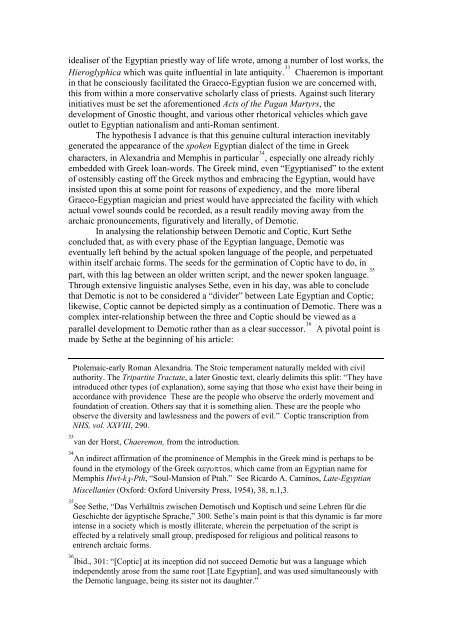THE EGYPTIAN FOUNDATIONS OF GNOSTIC THOUGHT
THE EGYPTIAN FOUNDATIONS OF GNOSTIC THOUGHT
THE EGYPTIAN FOUNDATIONS OF GNOSTIC THOUGHT
You also want an ePaper? Increase the reach of your titles
YUMPU automatically turns print PDFs into web optimized ePapers that Google loves.
idealiser of the Egyptian priestly way of life wrote, among a number of lost works, the<br />
Hieroglyphica which was quite influential in late antiquity. 33<br />
Chaeremon is important<br />
in that he consciously facilitated the Graeco-Egyptian fusion we are concerned with,<br />
this from within a more conservative scholarly class of priests. Against such literary<br />
initiatives must be set the aforementioned Acts of the Pagan Martyrs, the<br />
development of Gnostic thought, and various other rhetorical vehicles which gave<br />
outlet to Egyptian nationalism and anti-Roman sentiment.<br />
The hypothesis I advance is that this genuine cultural interaction inevitably<br />
generated the appearance of the spoken Egyptian dialect of the time in Greek<br />
characters, in Alexandria and Memphis in particular 34<br />
, especially one already richly<br />
embedded with Greek loan-words. The Greek mind, even “Egyptianised” to the extent<br />
of ostensibly casting off the Greek mythos and embracing the Egyptian, would have<br />
insisted upon this at some point for reasons of expediency, and the more liberal<br />
Graeco-Egyptian magician and priest would have appreciated the facility with which<br />
actual vowel sounds could be recorded, as a result readily moving away from the<br />
archaic pronouncements, figuratively and literally, of Demotic.<br />
In analysing the relationship between Demotic and Coptic, Kurt Sethe<br />
concluded that, as with every phase of the Egyptian language, Demotic was<br />
eventually left behind by the actual spoken language of the people, and perpetuated<br />
within itself archaic forms. The seeds for the germination of Coptic have to do, in<br />
part, with this lag between an older written script, and the newer spoken language. 35<br />
Through extensive linguistic analyses Sethe, even in his day, was able to conclude<br />
that Demotic is not to be considered a “divider” between Late Egyptian and Coptic;<br />
likewise, Coptic cannot be depicted simply as a continuation of Demotic. There was a<br />
complex inter-relationship between the three and Coptic should be viewed as a<br />
parallel development to Demotic rather than as a clear successor. 36<br />
A pivotal point is<br />
made by Sethe at the beginning of his article:<br />
Ptolemaic-early Roman Alexandria. The Stoic temperament naturally melded with civil<br />
authority. The Tripartite Tractate, a later Gnostic text, clearly delimits this split: “They have<br />
introduced other types (of explanation), some saying that those who exist have their being in<br />
accordance with providence These are the people who observe the orderly movement and<br />
foundation of creation. Others say that it is something alien. These are the people who<br />
observe the diversity and lawlessness and the powers of evil.” Coptic transcription from<br />
NHS, vol. XXVIII, 290.<br />
33<br />
van der Horst, Chaeremon, from the introduction.<br />
34<br />
An indirect affirmation of the prominence of Memphis in the Greek mind is perhaps to be<br />
found in the etymology of the Greek αεγυπτοs, which came from an Egyptian name for<br />
Memphis Hwt-k 3 -Pth, “Soul-Mansion of Ptah.” See Ricardo A. Caminos, Late-Egyptian<br />
Miscellanies (Oxford: Oxford University Press, 1954), 38, n.1,3.<br />
35<br />
See Sethe, “Das Verhältnis zwischen Demotisch und Koptisch und seine Lehren für die<br />
Geschichte der ägyptische Sprache,” 300. Sethe’s main point is that this dynamic is far more<br />
intense in a society which is mostly illiterate, wherein the perpetuation of the script is<br />
effected by a relatively small group, predisposed for religious and political reasons to<br />
entrench archaic forms.<br />
36<br />
Ibid., 301: “[Coptic] at its inception did not succeed Demotic but was a language which<br />
independently arose from the same root [Late Egyptian], and was used simultaneously with<br />
the Demotic language, being its sister not its daughter.”










